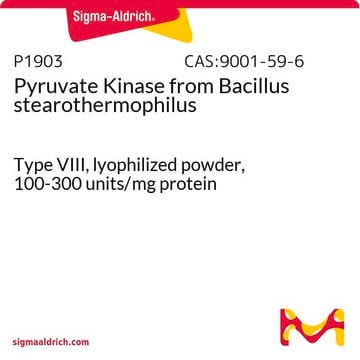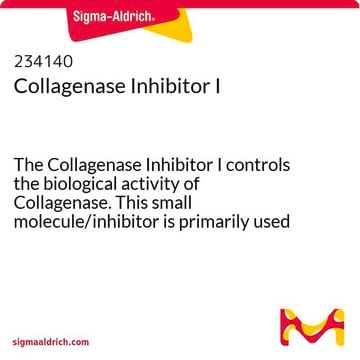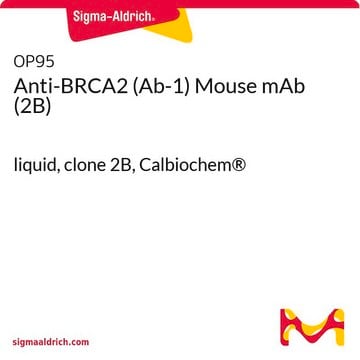SRP6054
ProNGF human
recombinant, expressed in E. coli, ≥95% (SDS-PAGE), ≥95% (HPLC)
Synonym(s):
Beta-NGF, Beta-nerve growth factor
Sign Into View Organizational & Contract Pricing
All Photos(1)
About This Item
Recommended Products
General description
The nerve growth factor (NGF) gene produces pro-nerve growth factor (proNGF), a soluble 246 amino acid pro-peptide. NGF belongs to the neurotrophin family. NGF gene is located on human chromosome 1p13.2.
Application
ProNGF human has been used as a standard in the de-glycosylation experiment for comparative studies by western blotting.
Biochem/physiol Actions
Pro-nerve growth factor (proNGF) participates in fetal neural development. It promotes neuronal survival and differentiation, or apoptosis, by interacting with particular nerve growth factor (NGF) receptors on neurons. Haploinsufficiency of the nerve growth factor β (NGFB) gene results in sensory neuropathy.
The precursor form of the nerve growth factor (proNGF) like its mature form is characterized by the cystine knot motif consisting of three cystine bridges, whereas proneurotrophins and mature neurotrophins elicit opposite biological effects. ProNGF functions preferentially via the complex of pan-neurotrophin receptor p75 (p75NTR) and vps10p domain-containing receptor sortilin inducing neuronal apoptosis and contributing to age- and disease-related neurodegeneration.
Physical form
Lyophilized from a 0.2 μm filtered solution of 20 mM PB and 250 mM NaCl, pH 7.2.
Preparation Note
Centrifuge the vial prior to opening.
Reconstitution
Dissolve in 1x PBS (It is not recommended to reconstitute to a final concentration less than 100 μg/mL.). This can further be diluted to other aqueous buffers.
Other Notes
Recombinant human ProNGF produced in E. coli is a non-glycosylated, non-covalently linked homodimer with each polypeptide chain containing 222 amino acids with an extra N-terminal Met and having a molecular mass of 25 kDa. The sequence of the first five N-terminal amino acids was determined and was found to be Met-Glu-Pro-His-Ser.
Storage Class Code
11 - Combustible Solids
WGK
WGK 3
Flash Point(F)
Not applicable
Flash Point(C)
Not applicable
Certificates of Analysis (COA)
Search for Certificates of Analysis (COA) by entering the products Lot/Batch Number. Lot and Batch Numbers can be found on a product’s label following the words ‘Lot’ or ‘Batch’.
Already Own This Product?
Find documentation for the products that you have recently purchased in the Document Library.
Gregory J Fitzgibbon et al.
Developmental medicine and child neurology, 51(10), 833-837 (2009-02-03)
Pain insensitivity is mediated at the genetic level by the disruption of specific genes associated with neuronal development. Mammalian in vivo and in vitro studies have shown the nerve growth factor (NGF) gene to play an integral role in nerve
Marzia Soligo et al.
Neurochemistry international, 140, 104812-104812 (2020-08-08)
The precursor of Nerve Growth Factor (proNGF) is the predominant form of NGF in the brain, where its tissue levels are increased in neurodegenerative diseases. proNGF exists in two main splicing variants, the long proNGF-A and the short proNGF-B. We
Jie Jiang et al.
Journal of cellular and molecular medicine, 24(10), 5901-5910 (2020-04-16)
Pancreatic cancer (PC) is a continuously high lethal disease, and the tumour microenvironment plays a pivotal role during PC progression. Herein, we focus on that the Nerve growth factor (NGF)/Tropomyosin-related kinase A (TrkA), in pancreatic stellate cells-pancreatic cancer cells (PSCs-PC
Christopher W Rowe et al.
BMC endocrine disorders, 19(1), 128-128 (2019-11-30)
Nerves and neurotrophic growth factors are emerging promoters of cancer growth. The precursor for Nerve Growth Factor (proNGF) is overexpressed in thyroid cancer, but its potential role as a clinical biomarker has not been reported. Here we have examined the
Our team of scientists has experience in all areas of research including Life Science, Material Science, Chemical Synthesis, Chromatography, Analytical and many others.
Contact Technical Service








